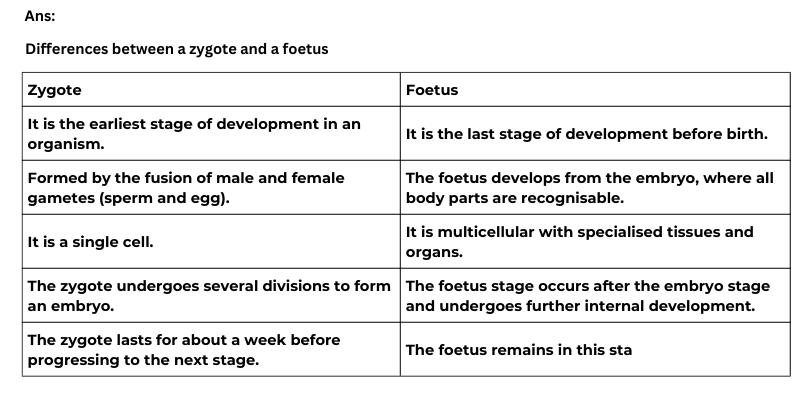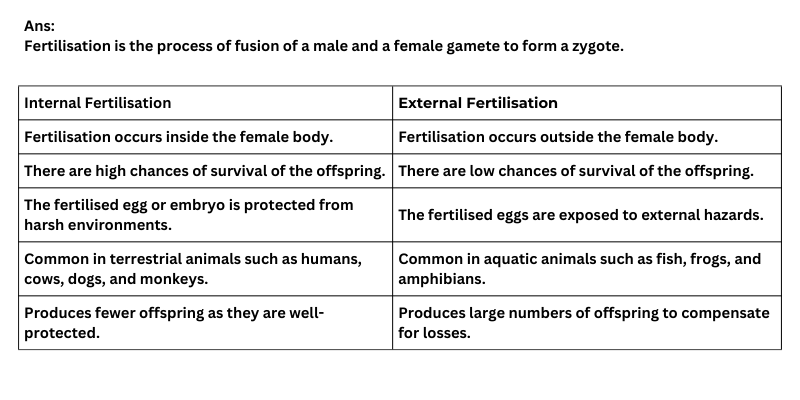1. Explain the importance of reproduction in organisms.
Ans:
The importance of reproduction in organisms is as follows:
Continuation of Species: Reproduction is a biological process through which organisms produce offspring, ensuring the survival and continuity of their species over generations.
Maintenance of Population: It helps maintain and increase the population of a species, preventing extinction.
Survival of Living Beings: Reproduction is essential for the survival of all living organisms, allowing them to adapt and thrive in changing environments.
2. Describe the process of fertilisation in human beings.
Ans:
Fertilisation is the process in which the male gamete (sperm) and the female gamete (egg) fuse together to form a zygote.
The male reproductive organ, the penis, releases sperms into the female body through the vagina during sexual intercourse.
The sperms travel from the vagina, through the uterus, and into the fallopian tubes, where they meet the egg released by the ovary.
Fertilisation occurs in the fallopian tube, where the nucleus of the sperm fuses with the nucleus of the egg, resulting in the formation of a zygote.
The zygote undergoes rapid cell division to form a cluster of cells called a morula, which develops into an embryo after about five days.
The embryo continues to grow and becomes a foetus after approximately eight weeks of development.
3. Choose the most appropriate answer.
(a) Internal fertilisation occurs
(i) in the female body
(ii) outside the female body
(iii) in the male body
(iv) outside male body
(b) A tadpole develops into an adult frog by the process of
(i) fertilisation
(ii) metamorphosis
(iii) embedding
(iv) budding
(c) The number of nuclei present in a zygote is
(i) none
(ii) one
(iii) two
(iv) four
Ans:
a) (i) in the female body
b) (ii) metamorphosis
c) (iii) two
4. Indicate whether the following statements are True (T) or False (F).
(a) Oviparous animals give birth to young ones. ( )
(b) Each sperm is a single cell. ( )
(c) External fertilisation takes place in the frog. ( )
(d) A new human individual develops from a cell called a gamete. ( )
(e) Egg laid after fertilisation is made up of a single cell. ( )
(f) Amoeba reproduces by budding. ( )
(g) Fertilisation is necessary even in asexual reproduction. ( )
(h) Binary fission is a method of asexual reproduction. ( )
(i) A zygote is formed as a result of fertilisation. ( )
(j) An embryo is made up of a single cell. ( )
Ans:
a) False
b) True
c) True
d) False
e) True
f) False
g) False
h) True
i) True
j) False
5. Give the differences between a zygote and a foetus.

6. Asexual Reproduction
Definition:
Asexual reproduction is a type of reproduction where offspring are produced from a single parent without the involvement of male and female gametes. It results in genetically identical offspring (clones) and does not change the number of chromosomes.
Two Methods of Asexual Reproduction in Animals:
Binary Fission in Amoeba:
It is a form of asexual reproduction in which a single organism divides into two identical daughter cells.
Amoeba is a unicellular organism with a cell membrane, cytoplasm, and nucleus.
Process:The nucleus divides first (Karyokinesis) to form two daughter nuclei.
The cytoplasm then divides (Cytokinesis), resulting in two separate cells.
The division can occur on any plane.
Each daughter cell is identical to the parent cell.
Budding in Hydra:
In budding, a new organism grows as an outgrowth (bud) on the parent organism.
The bud develops from a specific part of the parent’s body through repeated cell division.
Once the bud matures, it detaches and becomes an independent organism.
Example: Hydra, yeast.
7. In which female reproductive organ does the embryo get embedded?
Ans:
The embryo gets embedded in the uterus, a female reproductive organ.
Once the embryo attaches itself to the lining of the uterus (implantation), it begins to develop.
The development involves the formation of body parts such as legs, hands, eyes, etc.
At this stage of development, the embryo is called a foetus.
8. What is metamorphosis? Give examples.
Ans:
Metamorphosis is a biological process in which an animal undergoes a drastic change in its body structure during its development.
This change occurs through cell growth and differentiation.
It involves distinct stages such as egg, larva, pupa, and adult.
Examples:
Frog:
Frogs undergo metamorphosis from an aquatic tadpole to an adult frog with legs and lungs.
Insects:
Insects like butterflies transform from a caterpillar (larva) to a pupa and finally into an adult butterfly.
9. Differentiate between Internal Fertilisation and External Fertilisation

10. Complete the crossword puzzle using the hints given below.
Across
The process of the fusion of the gametes.
The type of fertilisation in a hen.
The term used for bulges observed on the sides of the body of a hydra.
Eggs are produced here.
Down
Sperms are produced in these male reproductive organs.
Another term for in vitro fertilisation.
These animals lay eggs.
A type of fission in amoeba
